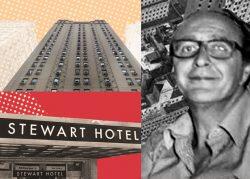New York is about to see something rarer than a UFO sighting: the conversion of a hotel to affordable housing.
Slate Property Group and RiseBoro Community Partnership are embarking on the redevelopment of the Hilton near the John F. Kennedy Airport in Queens, the New York Times reported. The development is expected to yield more than 300 units.
Hotelier Sam Chang is selling the property to the joint venture for an unspecified amount, but below $70 million. The hotel’s planned closure in June was reported in March as the property suffered from a decline in tourism.
The project is the first to use a 2021 state program created to make such conversions cheaper and easier. Until now, despite $200 million in available state funding, no developers had taken the bait because the program had strings attached and hotels had better options, such as temporarily housing asylum-seeking migrants or attracting tourists as the pandemic eased.
The program, part of the Housing Our Neighbors with Dignity Act, will provide $48 million to the $150 million Slate-RiseBoro project. The city’s Housing Development Corporation and Department of Housing Preservation and Development will also provide subsidies.
Approximately 60 percent of the units will be earmarked for the homeless, above the threshold required to get the state funding. The other units will be for low-income households and have rents of $1,250 for one-bedroom units and $1,500 for two-bedrooms.
RiseBoro will provide additional services to residents, such as mental health care. The developers hope to start renting units within two years.
David Schwartz, a principal at Slate, told the Times that the venture partners have explored hundreds of sites in pursuit of such a project since the onset of the pandemic three years ago. They found the Hilton appealing for its large rooms and lobby, as well as its residential zoning.
It’s far from certain that many (or any) others will follow suit, for the same reasons none had undertaken conversions until now. Half of the units must be for low-income tenants while the other half must be for homeless or recently homeless people. Subsidies beyond what the state program offers are needed for projects to pencil out.
— Holden Walter-Warner
Read more



